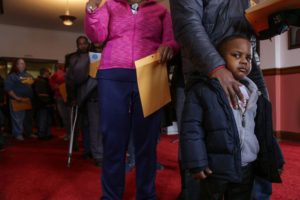Sometimes we make things more difficult than they need to be.
I was standing in line at a restaurant this week. In front of me was a man in an automated wheelchair, a urine collection bag at his side. Behind me was a woman in her mid-30s, her young son in tow.
The boy was curious about the man, and especially interested in the urine bag. He first asked about it in a normal speaking voice and, after being shushed, engaged in whispered shouts much to the astonishment and — dare I type it? — delight of bystanders. More than once a “we’ll talk about it later” was uttered.
As I stood and listened to the exchange, I watched the man in the wheelchair. His eyebrows raised, and then his lips crooked upward. He finally turned, and addressed the boy directly.
“Are you wondering about this bag?” he asked. The boy nodded and took a step closer to his mother’s leg. The man smiled again.
“My body doesn’t work in the same way that most do,” the man explained in the same tone most people use when chit-chatting about the weather. “I don’t always know when I need to go to the bathroom, so the bag prevents accidents.”
The boy nodded, and the entire situation immediately was defused.

My guess is, given the curiosity level of this particular youngster, the mom faced further questions later. But I’m also cautiously optimistic she was better prepared to answer them, given the matter-of-fact response the man had modeled for her.
It reminded me of a conversation I had with a co-worker last week, after she told me that a married couple, friends of her adult son, had their first child die from heart complications. I told my co-worker how awkward it was, following the stillbirth of our son, to walk into places and have conversations stop.
A friend at the time tried to explain, telling me that no one knew what to say, and that everyone was being especially cautious so as not to upset our family. I responded with genuine appreciation for the intent, but also noted that we already were upset. Having school hallways go silent as we walked our daughter to class, or people quickly steer carts away from us in the grocery store, didn’t protect us from the grief we already were shouldering — although it did serve as a constant reminder of what had happened.
The people who remain closest to us know our history and acknowledge it, good or bad. They take a common sense, matter-of-fact approach to life, understanding nothing ever can be completely swept under the rug. They don’t stop talking because they are unsure of what to say, and they view physical and mental challenges as one facet of a person.
This type of situational awareness is vital, I think, if our nation is going to move beyond its current partisan divide. If we can approach people who hold different political views and still manage to just see people, we can move forward.
And even if we all aren’t ready to take that step — to start looking at those on the other side of the divide as multifaceted humans just like ourselves — maybe we’ll be lucky enough to have a few role models step forward to set the tone and show us the way.
This column by Lynda Waddington originally published in The Gazette on Sept. 13, 2017. Photo credit: Ryan Garza/Detroit Free Press/TNS
